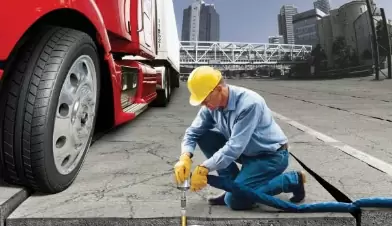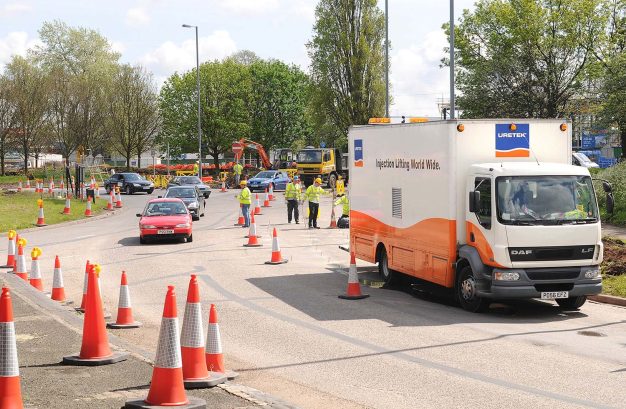
06.09 2022

Prolonged use, excessive loads, environmental factors, and other issues can lead to the deterioration of roadways. Individual concrete slabs used in the construction of roadways and parking areas can subside. As a result, the quality of the road surface deteriorates and the operating load on the vehicle increases.
This can especially appear in areas of heavy traffic, truck parking lots, loading areas, maneuvering areas, etc. The described cases can provoke accident occurrence, for the prevention of which the repair and leveling of the concrete surface are performed.
The range of tasks that can be solved by Slab Lifting concrete slabs technology is very wide. With the help of geopolymers, you can lift and level the sagging slabs position of the road section, and provide reconstruction of the emergency areas of the roadway adjacent to bridges, railway crossings, cargo beds, port docks, etc. The use of geopolymer resins is much more effective than the use of traditional technologies and materials to restore the road surface.
At the same time, a full cycle of repair procedures with the use of geopolymers takes from several hours to several days, while the restoration of the concrete surface with slab removal and reinstallation takes weeks or even months. Work using geopolymers can be done only partially by pinching traffic during the period of least traffic congestion. Passenger cars, loaders, and even heavy-duty vehicles can move over the repaired area as early as 15 minutes after completion of the work.
Deep Stabilization deep injection technology can also be used for the repair and construction of roads. It allows for increasing the bearing capacity of the base soils on which the road or parking area is arranged. This may be relevant when laying new highways and autobahns. Especially effective is the use of geopolymers on excessively wet soils. In this case, the reinforcement of the soil during injection occurs by displacing the “extra” water.
To stabilize, level, and elevate sections of concrete road surface using Slab Lifting technology, several holes with a diameter of 12-16 mm must be drilled in the roadbed. Tubes are inserted into the finished holes to inject the material. Geopolymer resins are injected directly under the concrete surface and, expanding, fill the voids in the soil and displace the “excess” liquid.
During expansion, the geopolymer material provides compaction and reinforcement of the soil, as well as the lifting of the sagging concrete slabs. The accuracy of slab lifting is controlled in real-time using laser levels. The maximum measurement error is ±1 mm.
